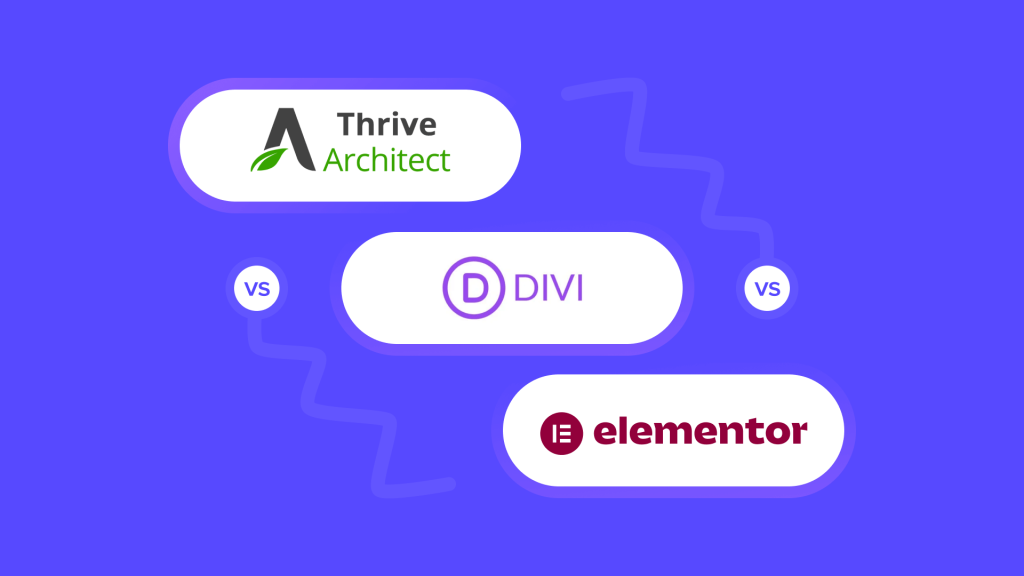Are you looking for a landing page builder for your WordPress site but are not sure whether to choose Thrive Architect, Divi, or Elementor?
Choosing the right page builder will allow you to customize your website and landing pages for better user experience and flexibility. This can help generate leads, increase conversions, and boost your site’s SEO.
In this article, we will compare Thrive Architect vs. Divi vs. Elementor and show you which page builder is best for your needs.
Brief Overview of Our Contenders
Thrive Architect, Divi, and Elementor are some of the best WordPress page builders on the market that come with drag-and-drop editors. They let you create attractive pages for your website without using a single line of code.
Thrive Architect is a powerful and beginner-friendly page builder that comes with 352+ pre-designed layouts and conversion-focused elements like buttons, countdown timers, and lead generation forms.
It also offers built-in SEO features, dynamic text, and A/B testing.
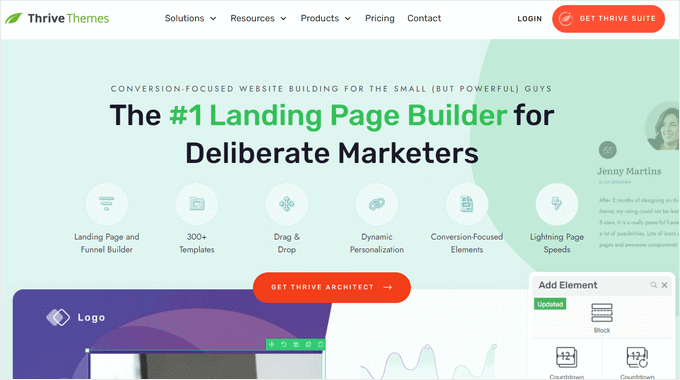
Plus, the tool is part of the Thrive Themes Suite and can easily integrate with their other plugins like Thrive Optimize, Thrive Theme Builder, Thrive Leads, and more.
Divi is a visual page and theme builder that has an extensive library of over 2000 premade layouts.
It is part of the Elegant Themes family and offers amazing features like split testing, lead capture forms, mobile responsive design, and fast loading times.
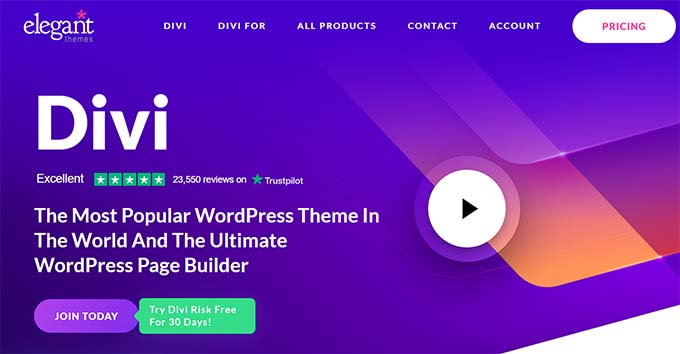
Finally, Elementor is also a popular website builder that was launched in 2016.
It has 100+ premade templates, form builders, and dynamic content, and comes with SEO tools to optimize your pages for search engines.
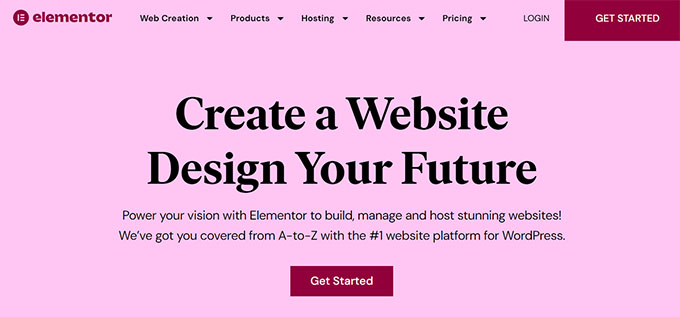
Having said that, let’s compare these WordPress page builders to see which one is better. We’ve broken down our comparison into the following sections:
Thrive Architect vs. Divi vs. Elementor – Ease of Use
When choosing a page builder, it is important to pick one that is beginner-friendly and super easy to use. The plugin should be designed in a way that even non-technical users can easily get the hang of it.
These tools must allow you to customize and create your landing pages without writing any code.
Let’s see how these three page builders compare to each other in terms of ease of use.
Divi – Ease of Use
Divi offers a drag-and-drop builder that allows you to create or edit your WordPress theme and landing pages.
It has more than 100 premade layouts and lets you edit your WordPress site on the front end. This means that you can see different elements as they are added to your website in real time and make changes accordingly to them.
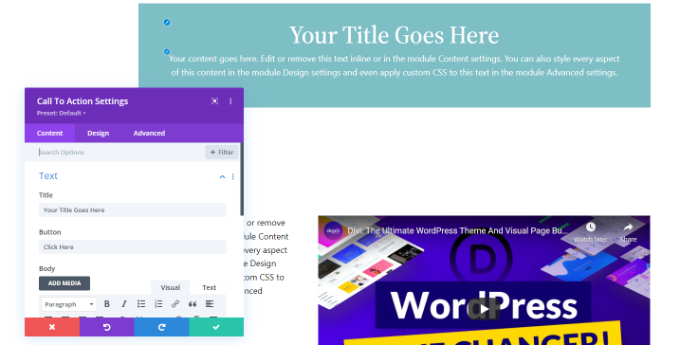
However, a major downside of Divi is that it does not show you a menu with different blocks including text, image, or video like the other page builders in this article.
Instead, the builder lets you choose a layout for the section you want to add and then lets you pick an element.
Overall, Divi is fairly easy to use, but it will take some time for beginners to learn its landing page customization and editing process.
Elementor – Ease of Use
Elementor has a powerful drag-and-drop builder that displays different block elements in the left column of the screen with a landing page preview on the right.
It also allows you to design mobile responsive pages by switching to mobile, desktop, and tablet views for the landing page.
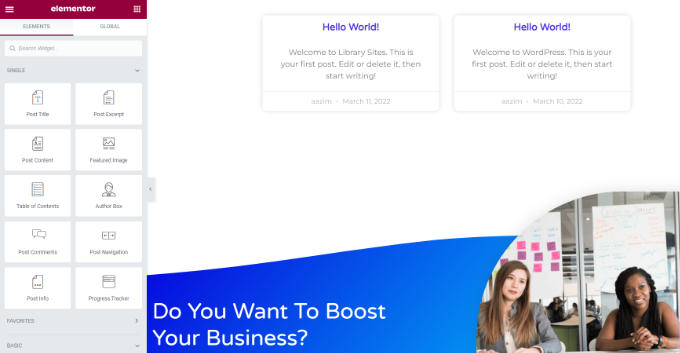
Additionally, the builder lets you view your revision history by clicking the ‘History’ button at the bottom left corner of the screen.
However, the only downside of the tool is that it does not offer an easy way to undo or redo the changes you made to the page, except for going through the revision history and reverting your changes.
Elementor can be a bit overwhelming for beginners due to so many features and elements, which can cause choice paralysis. But once you get the hang of it, the tool is reasonably easy to use.
Thrive Architect – Ease of Use
Thrive Architect’s drag-and-drop Architect is super easy to use. It lets you design your pages from scratch and even allows you to edit and customize the pages already published on your website.
You can add different elements to your page by clicking on the ‘+’ icon in the right corner of the screen. After that, you can edit the block’s position and layout in the column on the left.
You can also determine the scrolling behavior of the page and add animations and shadows to different elements on the screen from here.
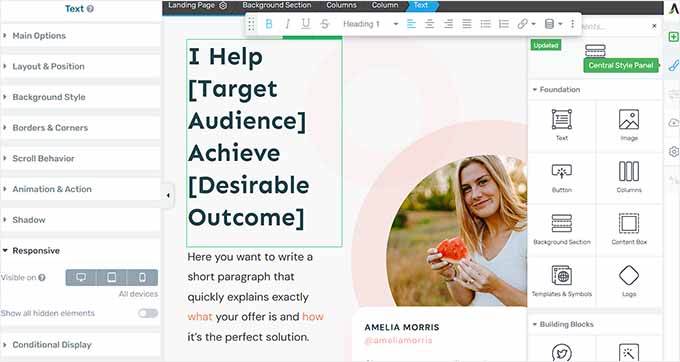
With Thrive Architect, you can also design your pages for different devices by expanding the ‘Responsive’ tab to configure the element’s visibility on mobile, desktop, or tablet.
You can also import/export your page content, set conditional logic, view the revision history, and revert previous changes by clicking the clock icon in the bottom left corner of the screen.
Plus, the tool lets you group related landing pages together and manage them as a unit, which can help if you want to share design elements or track conversions across multiple pages at the same time.
The page builder is also super fast and designed with speed in mind. This means that Thrive Architect won’t affect your website performance.
Winner – Thrive Architect
All three plugins offer a drag-and-drop builder and were built with beginners in mind. These page builders make it super easy to create landing pages without using any code.
However, Thrive Architect is the winner in this category due to its easy revision history and ability to revert changes in seconds.
Thrive Architect vs. Divi vs. Elementor – Customization Features
Another important factor to remember when choosing a page builder is the customization features offered by these different plugins.
You should choose a page builder that offers complete flexibility and creative freedom over the appearance of your pages.
Let’s take a look at the customization features offered by Divi, Elementor, and Thrive Architect.
Divi – Customization Features
Divi has around 2000 layouts and 200+ elements that you can use to create landing pages and themes.
It even comes with a full website pack for WordPress sites that includes templates for the homepage, contact page, and sales pages.
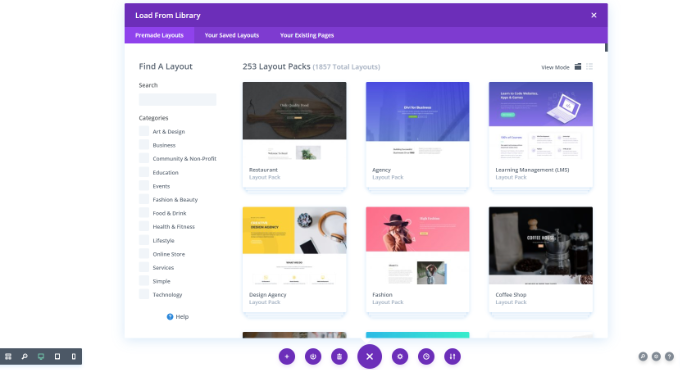
Additionally, the tool has the Global Colors feature and lets you structure your content with unlimited sections and rows.
Other than that, Divi lets you add an accordion, CTA, contact form, filterable portfolio, testimonials, maps, post navigation, and social follow. It even comes with special elements for WooCommerce stores like breadcrumbs, cart totals, checkout information, and shipping.
The builder provides you complete control over each element by letting you change the font color, add hover styling, use filters and effects to enhance the appearance of any element, or use custom CSS.
Elementor – Customization Features
Elementor has over 300 premade templates for different niches and purposes, including eCommerce, coming soon, education, events, products, thank you pages, and more.
Additionally, it lets you create custom headers and footers and add advanced effects like parallax scrolling, transitions, and animations.
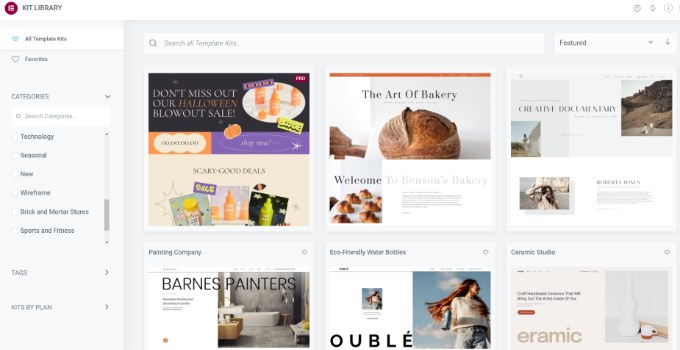
Elementor also offers over 100 widgets, including share buttons, countdown timers, post titles, and WooCommerce widgets. Other than that, you can use custom CSS to further style different page areas.
It also has some advanced customization features like conditional logic, global styles, adding custom code, or importing your fonts and icons.
Thrive Architect – Customization Features
Thrive Architect offers 352+ conversion-optimized templates for your landing pages. It also comes with smart color technology that lets you change the color scheme of your entire page in just one click.
It has premade templates for product launches, webinars, email capture pages, personal branding, coming soon pages, and home pages.
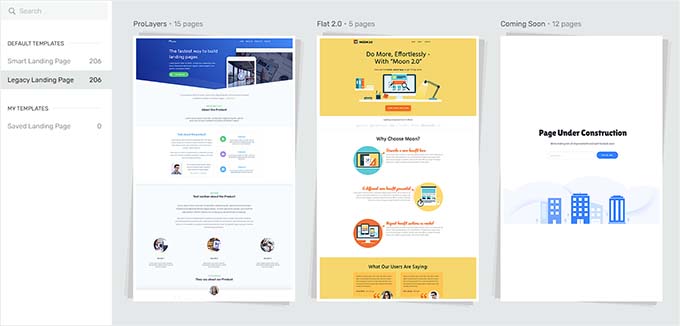
Additionally, the plugin has global site options where you can centrally manage all your important data and links such as contact information, social links, and logos.
Thrive Architect ships with numerous blocks that you can use to customize your website, including pricing tables, lead generation forms, progress bars, post list filters, audio, image gallery, Google Maps, Facebook comments, and so much more.
Thrive Architect also offers a vast library of Google Fonts from where you can select custom icons and fonts that are unique to your page.
Plus, the tool has special WooCommerce elements to help you build an online store, including product grids, single product pages, category pages, scarcity triggers, and social proof displays.
It also lets you add parallax scrolling, hover effects, and precise element spacing to create attractive landing pages. Other than that, the plugin allows you to add HTML attributes and custom CSS to different blocks easily.
Winner – Tie
Thrive Architect, Divi, and Elementor all provide a lot of different customization options that give you complete creative freedom over your landing page design.
You can select from any of the premade templates and further edit the appearance of each block by clicking on it. Additionally, you can perform advanced customization with custom CSS and code snippets.
Thrive Architect vs. Divi vs. Elementor – Performance
Your website’s speed and performance have a crucial role in boosting your SEO rankings.
If it takes a long time for your page to load, then most users will leave your site frustrated, increasing the bounce rate.
To test the performance of each page builder, we created a simple landing page with a headline, an image, and a button using Divi, Elementor, and Thrive Architect. After that, we used Google’s PageSpeed Insights tool to test the loading time for each landing page.
That being said, we will focus on the mobile page speed scores for this review because Google typically uses your site’s mobile version for indexing content.
Let’s see how the page builders perform.
Divi – Performance
Once we had created a landing page with Divi, we tested it using the PageSpeed Insights tool, and it displayed an overall score of 90 for mobile.
This is an excellent score showing that your landing page loads quickly and users will not be leaving your site frustrated.
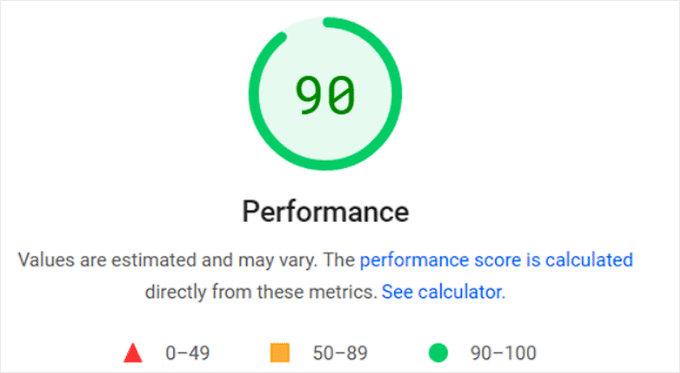
Elementor – Performance
The landing page that we created using Elementor had an overall mobile score of 81, which is also good.
However, compared to the other two page builders, Elementor’s performance is slower. This means that your page may face slight delays in load time.
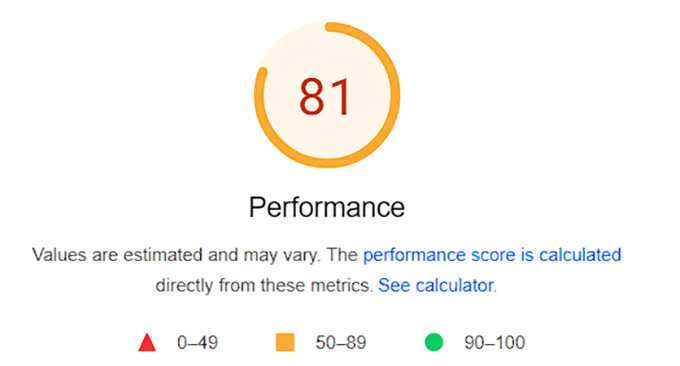
Thrive Architect – Performance
Upon testing our landing page created by Thrive Architect, the PageSpeed Insights tool showed an overall score of 91 for mobile. It is an amazing score that confirms that your site won’t be slowing down when using this builder.
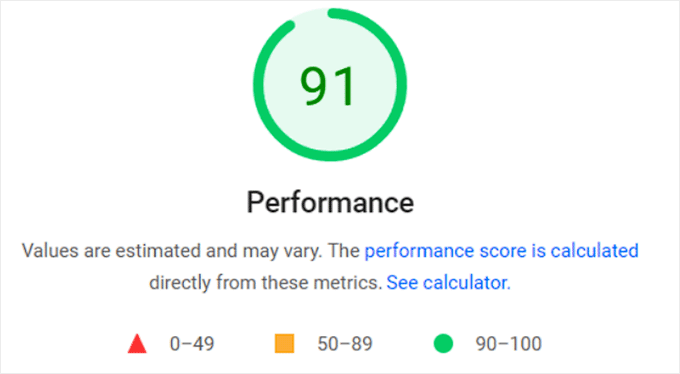
Winner – Thrive Architect
Thrive Architect performed slightly better than Divi and Elementor, scoring 91. The page builder avoids bloated code, which leads to faster speed and page load times.
Thrive Architect vs. Divi vs. Elementor – Integrations
Integrating your landing pages with third-party tools can enhance your website’s functionality and add more features.
For instance, you can connect with live chat software to provide live chat support to your customers, connect with email marketing services to capture leads, or accept payments directly by integrating the page builder with Stripe or PayPal.
That said, let’s take a look at the plugins and tools supported by Divi, Elementor, and Thrive Architect.
Divi – Integrations
Divi can easily integrate with numerous email marketing services like Constant Contact, AWeber, and Brevo (formerly Sendinblue).
It also connects with WooCommerce and offers built-in WooCommerce blocks like add-to-cart buttons, cart notices, product ratings, and more.
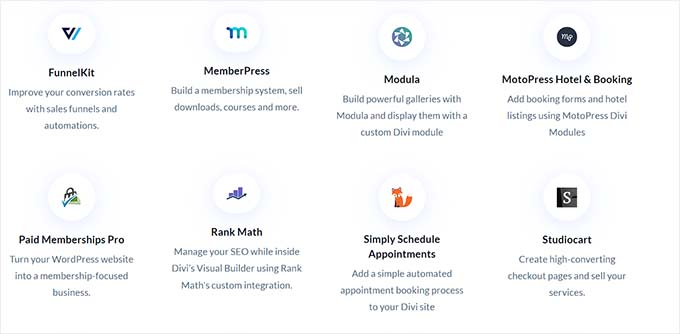
Other than that, the page builder integrates with Facebook, Google Fonts, HubSpot, FunnelKit, Twitter, and Google Maps.
Overall, it offers many integrations with all kinds of platforms, including social media, email services, and contact forms, making Divi a great choice.
Elementor – Integrations
Elementor offers a vast collection of third-party tools that you can integrate, including Constant Contact, Drip, ActiveCampaign, ConvertKit, and AWeber. It also connects with WooCommerce and LearnDash if you have an LMS system.
However, a major downside with the page builder is that to choose an integration, you must first enter the API key for your preferred service in the Elementor plugin settings.
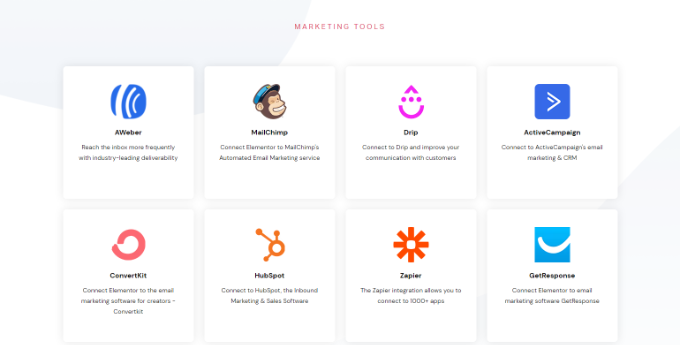
Apart from that, Elementor can also integrate with WPForms, YouTube, Vimeo, Google Maps, SoundCloud, and Slack.
Thrive Architect – Integrations
Thrive Architect offers third-party integrations with a huge number of email marketing tools, including ActiveCampaign, Contant Contact, Drip, and ConvertKit.
Other than that, you can easily connect with Slack, Facebook, Twitter, Dropbox, reCaptcha, SendOwl, HubSpot, Mailchimp, and many other tools.
Thrive Architect can also integrate with Zapier, which can be used to connect your landing page with over 5000 tools and automate your workflow.
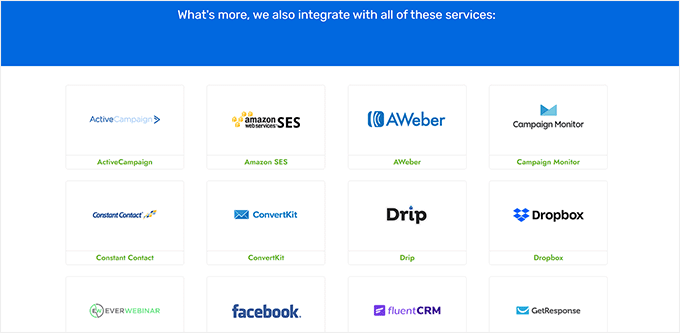
You can easily integrate the page builder with any third-party tool by visiting the Thrive Dashboard page. From here, select the ‘Active Connections’ section.
You can then choose a tool to integrate with from the dropdown menu and add its API key to connect it with Thrive Architect.
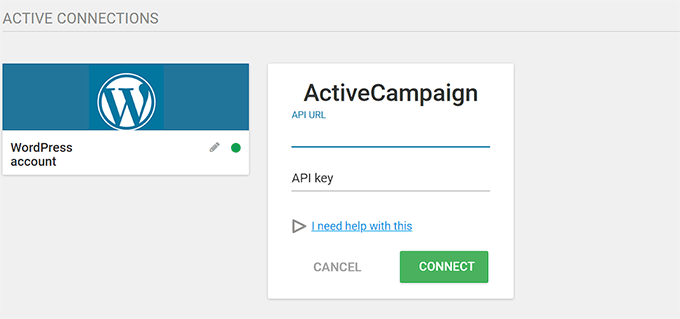
Winner – Tie
When it comes to integrations, all three page builders offer a lot of variety and also make it super easy to connect your landing pages with other third-party tools.
Plus, you can also connect any of these plugins with Zapier to access a huge number of other tools for integration.
Thrive Architect vs. Divi vs. Elementor – Customer Support
When creating a landing page, you may come across an issue or get stuck and need help.
This is where customer support comes in. You might need to chat with a support team member, access documentation, or watch tutorials to easily fix your issue and move forward with the page creation process.
Here’s how Divi, Elementor, and Thrive Architect stack up when offering support to users.
Divi – Customer Support
Divi offers support with a detailed knowledge base including FAQs, troubleshooting guides, hosting, and billing issues.
It also allows you to submit a contact form directly to Divi’s support team or use the live chat feature on their website.
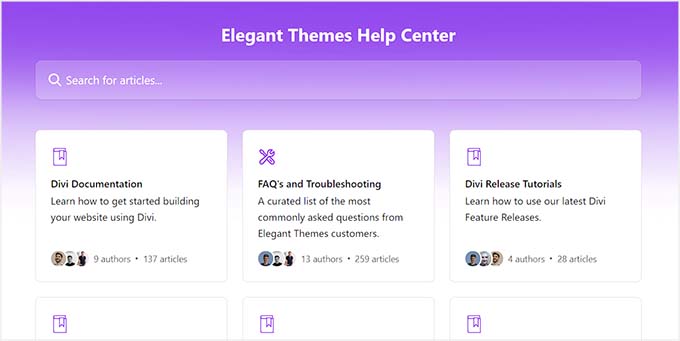
For complex issues, Divi also has a remote access feature where their support team can access your website and troubleshoot the problem for you.
Elementor – Customer Support
Elementor offers great customer support to its users by providing detailed documentation on different topics like installation, billing, hosting, Elementor editor, glossary, and known issues.
Its help center is also super organized, making it easier for users to browse through it.
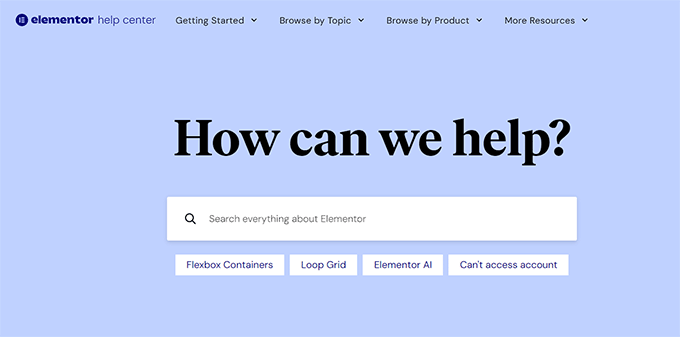
Additionally, you can join the Elementor Academy to access video collections, webinars, and tutorials that will help you master the page and website builder.
If you currently use the Elementor Pro plan, you will also get 24/7 premium support. All you have to do is submit a support ticket, and a support representative will respond to your query.
Thrive Architect – Customer Support
Thrive Architect offers amazing customer support and has a knowledge base containing comprehensive articles, tutorials, and FAQs about the plugin.
Other than that, it also has Thrive University, where you can sign up to access online courses. It also offers other videos on how-to tutorials, tips, and product news.
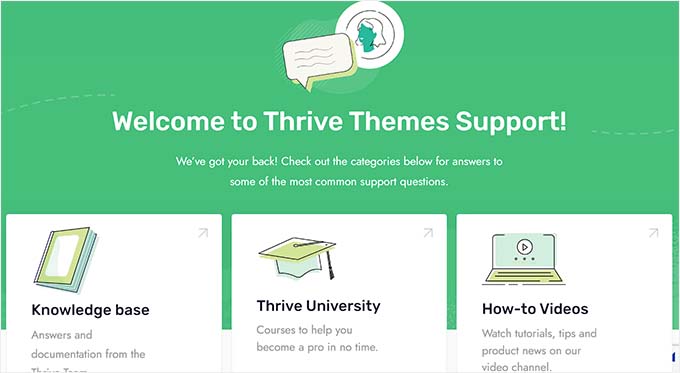
You can also visit the Thrive Help Center to get advice and answers for your plugin issues directly from the Thrive Themes team.
However, if you don’t find your answers in the documentation, then you can easily open a support ticket, access live chat support, and get phone support from the team during limited hours.
Winner – Thrive Architect
Overall, all three plugins offer excellent customer support. However, Thrive Architect is slightly ahead of others with its detailed documentation, video tutorials, courses, live chat support, tickets, and phone support.
Thrive Architect vs. Divi vs. Elementor – Pricing
When selecting a page builder, a crucial point to consider is pricing. LetLet’ske a look at the different pricing plans offered by Divi, Elementor, and Thrive Architect.
Divi – Pricing
You can buy a subscription for Divi for $89/year. However, to upgrade to the pro plan, you can buy Divi Pro for $287/year. This plan has advanced features like Divi AI, unlimited cloud storage, and 24/7 premium support.
Alternatively, you can buy a lifetime plan for Divi for $249 and Divi Pro for $729. This will be a one-time fee that will give you lifetime access to Divi.
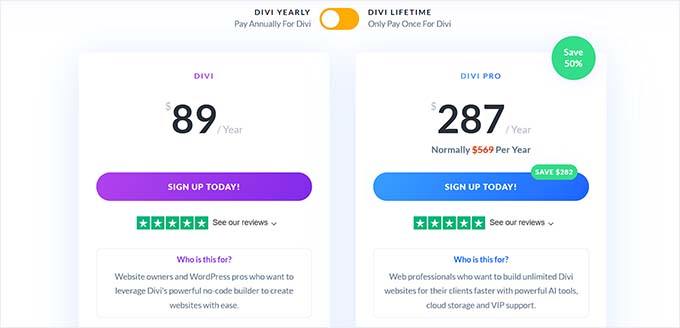
Elementor – Pricing
Elementor offers four pricing plans, starting with the ‘Essential’ plan for $59/year.
However, if you want to use the page builder on more than 1 website, then you can upgrade to the Advanced plan for $99/year. It allows you to add Elementor on three sites, offers 84+ widgets, and has a popup builder.
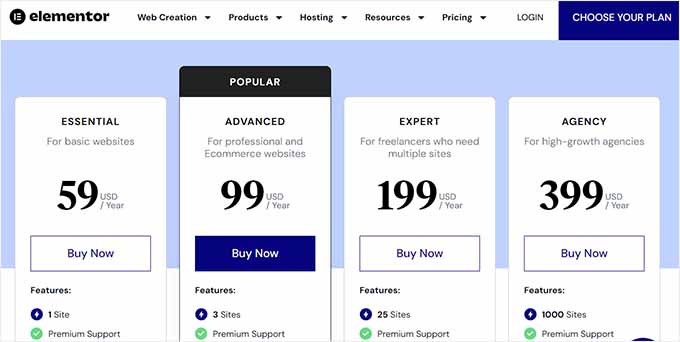
Similarly, you can opt for the Expert plan for $199/year to activate Elementor on about 25 websites or choose the Agency plan for $399 per year, which offers 1000 website activations.
Elementor also comes with a free plan that you can use to test the plugin before buying a subscription.
Thrive Architect – Pricing
You can get Thrive Architect for $99/year, and this plan comes with Thrive Automator, which is an amazing WordPress automation plugin.
Alternatively, you can buy the Thrive Architect & Thrive Optimize plan for $199/year. You can then use Thrive Optimize to A/B test different variations of your landing pages to see which one performs better.
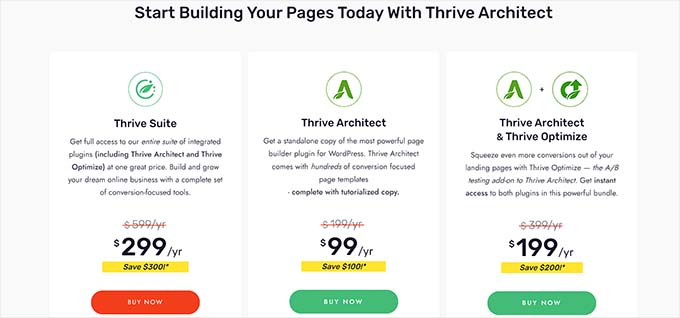
You can also buy the Thrive Suite for $299/year. It has 9 different plugins to help build a website, manage testimonials, configure comments, add quizzes, build an email list, sell online courses, and more.
Winner – Tie
In terms of pricing, all three page builders offer affordable pricing plans that show excellent value for money.
Thrive Architect vs. Divi vs. Elementor: Which One Is Better?
Thrive Architect, Divi, and Elementor are some of the best WordPress page builders on the market.
However, we believe that Thrive Architect is the better plugin for building custom landing pages that are optimized for conversions.
It comes with an easy-to-use drag-and-drop builder, numerous premade templates, amazing customer support, various integrations, and amazing pricing plans.
Plus, the plugin is also a part of Thrive Suite, which contains plugins like Thrive Leads, Thrive Theme Builder, Thrive Ovation, and Thrive Quizzes. You can use all these plugins together to create an amazing website.
For more information, see our complete Thrive Architect review.
Bonus: Choose the Right Form Builder for Your Site
Once you have chosen the right page builder for your site, it is time to decide on a form builder. You will need a form plugin to add different kinds of forms to your landing pages.
For example, if you have a membership site, then you will need to add a registration form. Alternatively, if you run a restaurant, then you must embed an online order form.
Even if you have a simple WordPress blog, you will still need to add a contact form so users can reach out to you.
We recommend choosing WPForms because it is the best WordPress contact form plugin on the market. It comes with a drag-and-drop builder, over 1500 premade templates, and complete spam protection, allowing you to create amazing forms for your website in just a few clicks.
For more information, see our complete WPForms review.
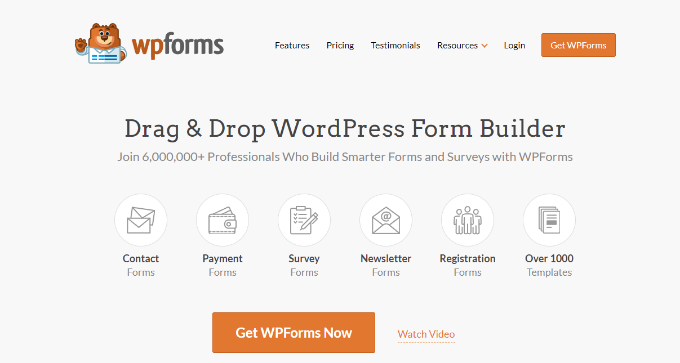
However, if you need an advanced builder to create complex forms, then Formidable Forms is an ideal choice. You can use it to create solution-focused forms like mortgage calculators, directories, or listing forms.
For more information on this, you may want to see our comparison between WPForms vs. Gravity Forms vs. Formidable Forms.
We hope this comparison between Thrive Architect, Divi, and Elementor helped you pick the right page builder for your website. You may also want to see our comparison between Elementor, Divi, and SeedProd for the best website builder and our expert picks for the must-have WordPress plugins.
If you liked this article, then please subscribe to our YouTube Channel for WordPress video tutorials. You can also find us on Twitter and Facebook.

